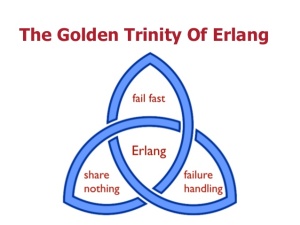I am recently teaching programming with Elixir and Phoenix in Kraków. During classes, I saw, that new Erlang and Elixir programmers have problems with concept of “failing fast”, so I’ll explain it with examples, but first I need to show you…
The Golden Trinity of Erlang
Torben Hoffman in many of his webinars about Erlang programming language mentions “The Golden Trinity of Erlang”

The three principles are:
- Fail fast
- Share nothing
- Failure handling
There are many articles explaining how sharing nothing is great for concurrency. Failure handling is usually explained when teaching OTP supervisors. But what does it mean to “fail fast”?
Failing fast principle
“Fail fast” principle isn’t exclusive to Erlang. In agile methodologies, it expands to:
- don’t be afraid to try something new;
- evaluate it quickly;
- if it works – stick with it;
- if not – abandon it fast, before it sucks too much money/energy.
This business approach translates almost directly to programming practice in Erlang.
Happy path programming
When I write in Erlang, I usually don’t program for errors. I can treat most errors or edge cases as if they don’t exist. For example:
{ok, Data} = file:read_file(Filename),
do_something_with_data(Data)
There is no code for handling situation, where file does not exist or I don’t have permissions to open it. It makes the code more readable. I only specify business logic instead of myriad of edge cases.
Of course, I can match on some errors. Maybe I want to create a file if it doesn’t exist. But in that case it becomes application logic, so my argument about not programming for edge cases still holds.
case file:read_file(Filename) of
{error, enoent} -> create_file();
{ok, Data} -> do_something_with_data(Data)
end,
This style of programming is called “happy path programming”. It doesn’t mean, that I don’t anticipate errors. It just means that I handle them somewhere else (by supervision trees and restarting).
Failing fast case study 1 – reading from a file
This style of programming requires the code to fail quickly, when problem occurs. Consider this code:
{_, Data} = file:read_file(Filename),
do_something_with_data(Data)
Reading the file could actually return {error, Reason} and then I treat the Reason atom as Data. This propagates the error further, where it is harder to debug and can pollute state of other processes. Erlang is dynamically typed language, so do_something_with_data/1 can pass atom many levels down the call stack. The displayed error will say, that it can’t treat atom as text and the bug gets tricky to find. Even functions, that are used purely for their side effects should match on something to check, if they worked, so instead of:
file:write_file(FileName, Bytes)
it is usually better to use:
ok = file:write_file(FileName, Bytes)
Failing fast case study 2 – calling gen_server
It is even more important to fail before sending anything wrong to another process. I once wrote about it in this blog post. Sending messages using module interfaces helps keep the damage made by errors contained. Crashing caller instead of server is “quicker”, so it doesn’t contaminate application state. It allows failure handling strategies much simpler than preparing for all possible edge cases. Most of the time those strategies are based on restarting processes with clean state. Processes and computation are cheap and can be restarted, but data is sacred.
Case study 3 – tight assertions
Lets consider another example. A test suite:
ok = db:insert(Value),
Value = hd(db:get(Query))
It tests database code by inserting single value to empty database and then retrieving it. However, if we assume, that the database was empty before test execution, we can make sure, that id doesn’t return anything else. Second line above is equivalent to:
[Value | _] = db:get(Query)
But I can make the assertion stronger by writing:
[Value] = db:get(Query)
It asserts both value and number of elements in the list. Sweet!
“Fail fast” is another example of applying “immediate feedback principle” in programming. It allows happy path programming, which makes programs more readable, but requires treating each line as an assertion. It is easy to do this with pattern matching.
Failing fast and supervision trees = ♥♥♥
Follow @snajper47
Hello tkowal! Thanks for the post!
Wouldn’t it be better to use “happy path” instead of “happy case”?
That is a good idea. I’ve always seen the term happy-case-programming, but there is even article on wikipedia about “happy path”. Thanks for the suggestion.